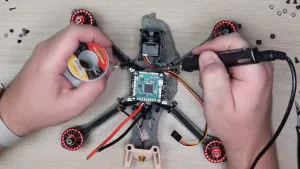I really enjoy Joshua Bardwell’s monthly news streams on YouTube, but sometimes they can be a bit lengthy. So, here’s a summary of what you might have missed from his latest video.
In this month's FPV drone news, we cover significant developments, including a critical bug affecting the DJI Goggles 3 and O3 Air Unit, new hardware releases for OpenIPC, and potential threats from the FCC to the 900 MHz band. This article distills the highlights from a recent news stream, providing a concise overview for drone enthusiasts.
This Month's Drone News: Highlights and Updates
This month has seen some major developments in the world of FPV drones. Notably, there's a critical bug affecting the DJI Goggles 3 and O3 Air Unit that has raised concerns among users. Additionally, new hardware releases for OpenIPC from both RunCam and eMax are generating excitement. Finally, a spotlight documentary on the International Open offers a glimpse into the FPV community.
DJI Goggles 3 and O3 Air Unit Bug
The DJI Goggles 3 and O3 Air Unit are currently facing a serious issue that has led to drone crashes and loss of control. Users are advised not to use these products together until a fix is issued. The disconnection problem occurs randomly, and once disconnected, these units do not reconnect without a complete reset. This poses a significant risk, even for those who typically fly at close range or rely on GPS rescue features.
Reports suggest that the issue may be tied to the TX and RX wiring between the air unit and flight controller, which is crucial for maintaining a stable link. While some users have proposed cutting wires to avoid the bug, this is not a viable solution as it can lead to other operational failures. DJI is reportedly aware of the problem and is investigating, but no timeline for a fix has been established yet.
OpenIPC Hardware Releases
In exciting news for the FPV community, both RunCam and eMax have launched hardware compatible with OpenIPC, an open-source digital video transmission system. The RunCam WiFi Link and eMax's two different OpenIPC VTXs are now available for purchase, marking a significant step forward for OpenIPC's development.
These products are priced competitively, with the RunCam WiFi Link at around $70 and eMax's offerings starting at $40. This affordability is one of the key promises of open-source projects, allowing enthusiasts to experiment without the hefty price tag typically associated with proprietary systems. However, it's important to note that there are currently no VRX options available, which limits the ability to use these VTXs in traditional FPV setups.

Users looking to explore OpenIPC will need to navigate some challenges, including potential latency issues when using mobile devices as receivers. Initial tests have shown varying latency depending on the phone's performance, with best-case scenarios achieving around 35 milliseconds. Although the hardware is still in its early stages, the support from established manufacturers like RunCam and eMax signals a promising future for OpenIPC.
Spotlight: International Open Documentary
This month also features a spotlight on a short documentary created by MultiGP and Lehiin Vender, which captures the essence of the International Open event. This behind-the-scenes look highlights the experiences of pilots and the vibrant FPV community, showcasing the excitement and camaraderie that events like this foster.
The documentary runs for just over ten minutes and is perfect for those who want to immerse themselves in FPV culture, whether they attended the event or not. It’s a great way to reflect on the community's spirit and the joy of flying drones together.
Race Gow Announcement
This month marks the exciting return of racegow, a virtual racing event that allows drone pilots to compete against one another from anywhere in the world. Registration opened recently, and participants have until September 29th to submit their times for the first track. The event is designed to mimic traditional racing formats, where pilots set up predetermined courses and race against the clock while recording their performances.

What is Racegow?
Racegow is a unique opportunity for drone enthusiasts to showcase their flying skills in a competitive setting. Participants set up a course, record their flights, and submit their times to see how they stack up against others globally. Even if you miss the initial submission, you can still compete in subsequent weeks. The leaderboard offers a fun way to track progress and improvement over time

Participation Requirements
While a lap timer is not mandatory to take part in racegow, it is highly recommended. Participants submit their flight times based on DVR footage, which timestamps when the pilot crosses the finish line. Having a lap timer allows for better tracking of personal performance, making it easier to identify faster laps without the need to review DVR footage post-flight.
FCC NPRM Threatening 900 MHz Devices
A significant development this month is the FCC's Notice for Proposed Rulemaking (NPRM), which could impact various 900 MHz devices, including ExpressLRS and Crossfire systems. This NPRM has been initiated following a petition from NextNav, seeking priority access to a portion of the 900 MHz band, specifically from 902 to 928 MHz.

Photo by Benedikt Zinn
What Does This Mean for FPV Pilots?
The proposed changes could restrict the use of devices currently operating in the 900 MHz range. While existing devices may still function, the potential for interference is a concern. New devices might be required to implement software that yields priority to NextNav's signals, which could limit the number of FPV devices operating simultaneously without interference.
Community Response
The FPV community is urged to stay informed and involved. Organizations like the ARRL are actively fighting this proposal, but input from users is crucial. While the window for public comments has closed, awareness and advocacy remain important as the FCC considers these regulations.
In Closing
As we wrap up this month's highlights, it's clear that the FPV community continues to innovate and adapt amidst challenges. From competitive racing events to advocacy for device safety, the passion for drone flying remains strong. Stay tuned for more updates and exciting news in the coming months!







